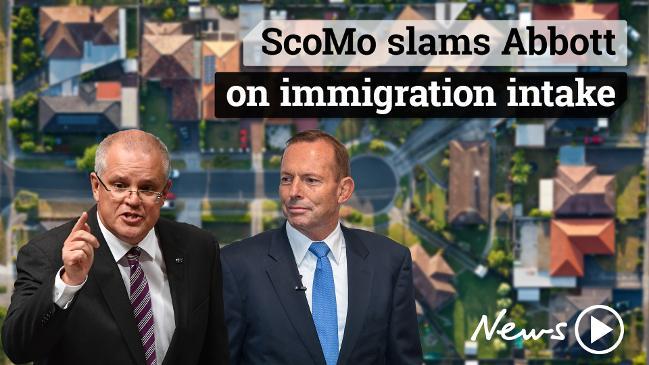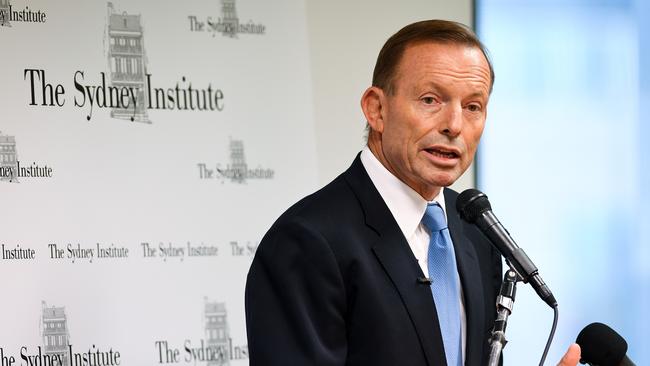The big problems with Tony Abbott’s call to slash immigration
TONY Abbott is back in the spotlight after he gave a controversial speech. Here’s why his logic doesn’t add up.

OPINION
TONY Abbott’s call to slash Australia’s migrant intake is lazy, contrary to economic research and hypocritical — and not just because he himself is an immigrant.
The former prime minister delivered a speech last night calling for the intake to be reduced from 180,000 to 110,000 a year, saying current levels were responsible for “stagnant wages, unaffordable housing and clogged infrastructure”.
But Liz Allen, a demographer and social researcher at the Australian National University, said the facts speak for themselves.
“The economic benefits of our migration intake are clear,” she told news.com.au. “That is, based on research, our current migration program in Australia is a demand-driven program. Evidence shows that the optimal level for Australia, given the population characteristics, is between 160,000 and 210,000.”
In other words, a migrant intake over 210,000 will produce diminishing returns, while an intake below 160,000 — as Mr Abbott is advocating for — will be ineffective for economic growth.
According to Dr Allen, there’s little evidence to suggest migrants have a diminishing impact on the economy.
“If we were to look at the net effects of the contribution to the economy, Australia benefits and gains more from migrants than migrants draw from Australia,” she said.

The issues themselves — housing affordability, infrastructure, rising inequality and stagnant wage growth — are absolutely valid, but they can’t all be blamed on immigration.
They reflect a failure in government policy over decades and an inability to make long-term investments.
Take housing affordability. Mr Abbott, as prime minister, literally expressed a desire for housing prices to continue increasing.
“As someone who, along with the bank, owns a house in Sydney I do hope our housing prices are increasing,” he said in 2015.
“I want housing to be affordable but nevertheless, I also want house prices to be modestly increasing.”
As prime minister, Mr Abbott ruled out changes to negative gearing and capital gains tax breaks for investors — policies which had been criticised for triggering growth in housing prices. He also abolished the National Housing Supply Council.
To now turn around and feign concern for young Australians priced out of the housing market simply because it’s a convenient opportunity to hit out at immigrants, is a stinging hypocrisy.
Mr Abbott also addressed perceived social problems with Australian migrants, arguing: “With no insistence that refugees learn English, it’s hardly surprising that only 30 per cent of the last decade’s intake are proficient; but without the national language how can newcomers ever really find a job and fully integrate into our way of life?”
It’s worth noting that Tony Abbott is conflating two issues here; skilled migrants, and refugees Australia is obligated to accept.
He actually makes no reference to Australia’s humanitarian intake specifically, nor does he mention refugees again in the speech.
But his remarks on language triggered a backlash on Twitter, with many high-profile Australians from non-English speaking backgrounds sharing their stories.
My mum arrived here as a 6 year old. No English. Ended up being a school teacher for decades. Dad was born here but spoke no English at home. Became a lawyer. I’m the Attorney General of Victoria, and you - mate - can get stuffed. Australian enough for you? https://t.co/9EbACWqZrB
— Martin Pakula (@MartinPakulaMP) February 20, 2018
My parents didn’t speak a word of English when they arrived in Australia. They spoke only Greek at home to us. Raised 2 kids with 8 degrees, Order of Australian Medal & 30 awards for community service. My heroes. Our values. Our county. You don’t like it, you can piss off Peter. https://t.co/Ssd92C908y
— Kon Karapanagiotidis (@Kon__K) February 20, 2018
About 21% of Australians speak a language other than English at home. Being multilingual doesn’t make you any less Australian or any less committed to this country. Most of us are proud to be multicultural https://t.co/hUnX2dHOFb
— Tim Soutphommasane (@timsout) February 20, 2018
According to Dr Allen’s research, people from non-English speaking backgrounds actually tend to outperform native citizens.
“We see entrepreneurial behaviour is different among first and second-generation migrants,” she said. “That’s because typically migrants from a non-English speaking background tend to do so with some wealth. They’re typically healthier, they’re more likely to create businesses and start-ups. They’re risk-takers.
“This idea of otherness to me is concerning because it sets a tone of ‘us against them’. I’m a strong advocate for steering the conversation about assimilation and integration into looking at what makes Australia great - and that’s diversity.”
And for what it’s worth, Mr Abbott’s own colleagues have echoed Dr Allen’s view.
Treasurer Scott Morrison rejected Mr Abbott’s plan as a $1 billion-a-year folly, saying it was a case of “cutting off your nose to spite your face”.
“If you cut the level of permanent immigration by 80,000 it would cost the Budget, it would hit the bottom line — the deficit — by $4 billion to $5 billion over the next four years,” he said.
Responding on 2GB this afternoon, Mr Abbott said he believes Mr Morrison has been “captured by his department”.
“We cannot let the Treasury’s accounting rules determine what’s in our long and medium-term best national interests. If we want a fighting chance of winning the next election, some things have got to change.”
Home Affairs Minister Peter Dutton — whose comments on the migrant intake last week inspired this whole discussion — dismissed Mr Abbott’s concerns today, saying “we’ve got the settings right”.
Simply cutting down on migrants won’t fix the issues Mr Abbott had plenty of opportunity to tackle in government — and actively chose not to.
“If we were to cut out immigration tonight and shut the door to Australia, we would still have a growing population,” said Dr Allen. “We’d still have a need for more schools and hospitals in Sydney. The idea that we can stay put in some kind of historical holding point harks back to the 1950s.
“We’re in a different economy and a different environment, and Tony Abbott professing a level not based in evidence will send Australia backwards.”
Follow Gavin on Twitter at @Gavindfernando.



